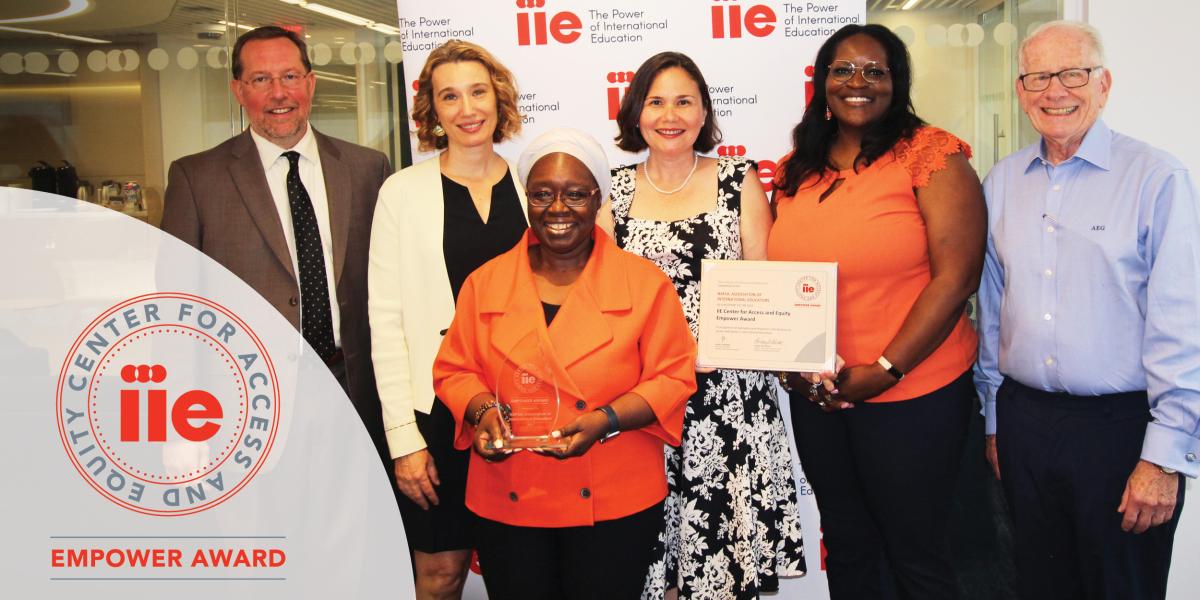
Fostering diversity, equity, access, and inclusion (DEI) is—and has long been—a through line in all of NAFSA’s work. The U.S. Supreme Court's recent decision striking down race-based admissions practices in higher education underscores the paramount importance of our work in building bridges between international education and DEI.
This week, NAFSA was honored to receive the inaugural Empower Award from the Institute of International Education (IIE) Center for Access and Equity. NAFSA and IIE share a commitment to these issues, and NAFSA is grateful for IIE’s recognition and partnership. This recognition provides a timely opportunity to reflect on the work we’re proud of and what we still have to do as an organization and a field.
The association’s commitment to DEI is best expressed in a few major areas: advancing the profession; preparing the next generation; and creating a sense of belonging for NAFSA members.
Advancing the Profession
- Diversity Impact Program: In 2013, NAFSA launched this initiative to diversify the field of international education by awarding funds to assist underrepresented institutions in building capacity to internationalize the curriculum and further global competence. The program was offered from 2013 to 2018 and awarded a total of 117 grants during that period.
- RISE: In 2020, NAFSA introduced the NAFSA RISE (Representation, Inclusion, Support and Empowerment) Fellowship, which is welcoming its fourth cohort this year. The RISE Fellowship provides international education professionals from underrepresented communities with financial support and access to professional development, mentorship, and networking.
- International Education Professional Competencies 2.0: NAFSA is committed to making inclusion and equity a core competency in the international educator’s toolbox. Our International Education Professional Competencies, designed to set the standards for the profession, were updated in 2022 to explicitly include expertise, duties, and tasks related to effectively engaging with people from different cultures and identities and actively challenging systems and structures that perpetuate discrimination.
- NAFSA 2023 Annual Conference & Expo: Grounded in the NAFSA 2023 theme, “Inspiring an Inclusive Future,” the conference program provided another important avenue for furthering dialogue and spurring action in this area. Sessions, workshops, and other programming explored topics including diversifying the voices that shape the future of the field and new models for comprehensive and inclusive internationalization.
- NAFSA Awards: Every year, NAFSA recognizes an individual who has shown commitment to strengthening the relationship between international education efforts and underrepresented campus communities with the NAFSA Award for Impact in Diversity, Equity, and Inclusion in International Education. Additionally, many of the institutions that have been recognized with the Senator Paul Simon Award for Campus Internationalization are notable for their work at the intersection of internationalization and DEI.
Preparing the Next Generation
- Tamara H. Bryant Scholarship: Since 2019, NAFSA and the Fund for Education Abroad have administered this scholarship, which creates study abroad opportunities for Black undergraduate students. More than $200,000 in scholarships have been awarded to students at more than 30 institutions that embrace the late Tamara Bryant’s resilience and commitment to intercultural exchange.
- Policy and Advocacy: NAFSA is a leader in pushing for federal policy that would increase access to international education. Specifically, we have long championed the bipartisan Senator Paul Simon Study Abroad Program Act, designed to expand and diversify study abroad participation and destinations. This bill would codify the U.S. State Department’s Increase and Diversify Education Abroad for U.S. Students (IDEAS) program, which provides higher education institutions with competitive grant funding to help overcome the institutional, cultural, and curricular barriers that prevent students from studying abroad. NAFSA also plays a leadership role in urging the Biden administration to adopt a national strategy for international education, which—among other objectives—would establish policies, fund programs, and set targets to increase the number and diversity of U.S. students studying abroad and of international students studying at U.S. higher education institutions.
Creating a Sense of Belonging for Members
- Member Interest Groups: NAFSA members are the association’s best asset. Through the years, members have led the charge in advocating for greater diversity in the field and among students. To further these goals, members have founded multiple Member Interest Groups (MIGs) and Special Interest Groups (SIGs)—including the Rainbow SIG (founded in 1993), Black/Multicultural Professionals in International Education SIG (B/McPIE) (founded in 1989), International Education for Persons with Disabilities (IEPD) MIG (founded in 1994), and others. These affinity groups create a sense of community, galvanize members to action, and advocate for positive change at NAFSA.
- NAFSA Regions: NAFSA’s 11 regions create important pathways and opportunities for members to connect, collaborate, and support each other on the DEI issues specific to their region and local communities.
As NAFSA Executive Director Fanta Aw often says, quoting an African proverb, “If you want to run fast, run alone. If you want to run far, run together.” That adage certainly applies here. As NAFSA continues the work of fostering diversity and creating greater access, equity, and inclusion in the field of international education and beyond, our success truly rests on the combined efforts of our members and partners along the way.
